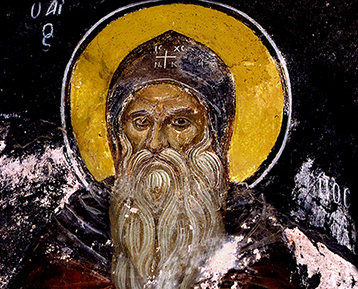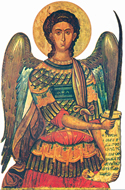 Loading... Please wait...
Loading... Please wait...Search our Talks
MP3 Downloads
Update on New Talks
Abba Pambo
Abba Pambo (†375)

A Short Life of Abba Pambo
Commemorated 18 July
Pambo was an Egyptian and an ascetic on Mount Nitria. He was a contemporary of St. Anthony the Great and was himself great in monastic asceticism. He was known particularly for two characteristics: through long training he sealed his lips so that he did not speak one unnecessary word; and he never ate any bread except that which he earned with his own hands by weaving reeds.
He was like an angel of God and, in later years, his face shone like the face of Moses once did - so much so that the monks were unable to look him in the face. He never gave a quick reply, even to a simple question, without first praying about it and contemplating it in his heart. Patriarch Theophilus of Alexandria once visited the monks in Nitria. The monks begged Pambo, saying: “Give the patriarch an edifying word, which would be of benefit to him.” The quiet Pambo replied: “If he does not benefit by my silence, he will not benefit by my word.”
Once, St. Pambo travelled throughout Egypt with his monks. They came upon a group of men who remained seated as the monks passed by. St. Pambo addressed them and said: “Arise and greet the monks, that you may receive a blessing from them; for they continually converse with God and their lips are holy.”
This glorious saint was able to clearly discern the destiny of both the living and the dead. It was said that sometimes Saint Pambo’s face shone like lightning, as did the face of Moses. Yet, speaking to the brethren who stood about his deathbed, Saint Pambo said: “I go to the Lord as one who has not yet begun to serve Him.”
He rested in the Lord in the year 386 A.D. at the age of 70.
A Prophesy of Abba Pambo About the Last Times
A monk once asked Abba Pambo, “Is it true, Abba, that the customs and traditions of Christians will change and there will be no priests in the churches?”
“In those days, the love for God in many souls will grow cold and great distress will fall upon them. There will be conflict between nations, migrations of peoples, unstable Kings, rulers will be corrupt, the priests will become prodigals, and the monks will live negligently.
The clergy will be indifferent concerning salvation, as much for their own souls as for the souls of their flocks, and they will despise any such concern. All of them will show eagerness and energy for every matter regarding their dining table and their appetites. They will be quarrelsome, lazy at their prayers but eager to criticize, and ready to accuse.
They will neither want to imitate nor listen to the lives and counsels of Elders, but mostly, they will be all talk and say: “If we had lived in those times, we would have behaved in a similar way.
The bishops of those times will be subservient [obedient and compliant] to the powerful of the world, and they will make decisions according to the gifts they receive from everywhere, and consulting the rational logic of the academics.
They will not defend the poor when they are accused. They will grieve the widows and harass the orphans. Infidelity, immorality, hatred, enmity, jealousy, strife, theft, drunkenness, rampant entertainment, adultery, fornication, murder and robbery will also enter into people’s lives.”
The brother then said: “And what can one do in such difficult times?”
And the Elder answered: “My child, in such days the one who wants and tries to save his soul will be saved, and he will be called great in the Kingdom of Heaven.”
Abba Pambo’s Prophesy - Is he Describing Our Times?
By Father Kosmas
There are two points, among many, which stand out about the above prophecy. The first point is where the saint says that the clergy of the last times will not want to listen to or imitate the lives and counsels of grace-filled holy elders – those men granted the gift of discernment by God. This is important as it is now evident that today’s clergy, especially many bishops, could not be seeking or listening to the guidance of holy elders, because if they were, they would not be forcing the faithful and clergy to wear masks and receive vaccinations. The second point is where the saint says that the bishops will be “consulting the rational logic of the academics”. This is what is happening today. They are listening to anti-Christian governments, scientists, and doctors who they consider to be higher than God Himself. “But Peter and the other apostles answered and said: ‘We ought to obey God rather than men’” (Acts 5:29). The apostles said this to the secular authorities who were demanding that they disobey God by ceasing their preaching. This also can apply to the clergy and the faithful towards the bishops: better to obey God rather than bishops that have gone astray.



